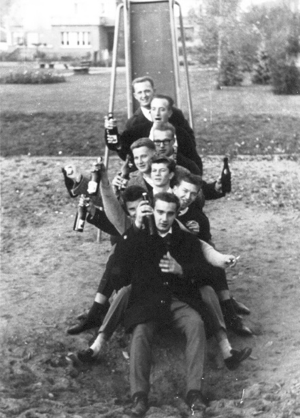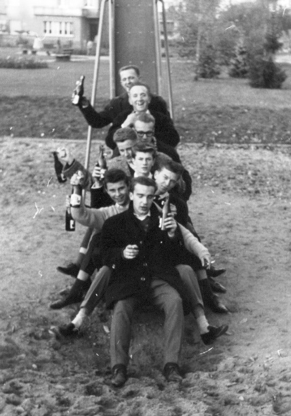_ _ _ _ _ _ _ _
/ \ / \ / \ / \ / \ / \ / \ / \
( M | E | M | O | R | I | E | S )
\_/ \_/ \_/ \_/ \_/ \_/ \_/ \_/
_ _ _ _ _
/ \ / \ / \ / \ / \
( O | F ) ( T | H | E )
\_/ \_/ \_/ \_/ \_/
_ _ _ _ _ _ _
/ \ / \ / \ / \ / \ / \ / \
( A | M | E | R | I | C | A )
\_/ \_/ \_/ \_/ \_/ \_/ \_/
_ _ _ _ _ _ _ _
/ \ / \ / \ / \ / \ / \ / \ / \
( S | O | L | D | I | E | R | S )
\_/ \_/ \_/ \_/ \_/ \_/ \_/ \_/
_ _ _ _ _ _ _ _ _ _ _
/ \ / \ / \ / \ / \ / \ / \ / \ / \ / \ / \
( I | N ) ( F | R | I | E | D | B | E | R | G )
\_/ \_/ \_/ \_/ \_/ \_/ \_/ \_/ \_/ \_/ \_/
From 1950:
Tanks in the Wetterau
My first memories of the U.S. Army are from the fifties, when tanks rolled through Fauerbach at night coming from the barracks. There was not yet the maneuver area at Winterstein. The bridge from Ockstadt over the highway was built only in the late 50s. (My parents often went with us children into the forest and we had to cross the highway on foot).
Ca. 1956:
Military training area at Winterstein
While picking mushrooms at the tank training area in the Ober-Mörl forest at Eichkopf, I found a machine gun belt with practice ammunition (blanks). I gave it to my friend P., who was already interested in everything American at that time. His parents had been friends with Americans before - perhaps because they had been assigned an apartment in their house after the war.
ca. 1959:
Dance evenings at the Hanau Officers' Club
A teacher at the Schillerschule (girls' high school in the Burg) had contacts with the Hanau Officers' Club and organized bus trips for schoolgirls from grade 10 (from age 16, dance lessons) to dance evenings. It was extremely courageous of the young and progressive teacher to get so involved in a school with a whole bunch of quirky single women (who at that time made a point of being addressed as Fräulein).
Marriage and emigration
During this time there were more frequent friendships between GI's and girls, which also led to marriages and emigration. One example was the "Tannenhof", located at the edge of the forest between Bad Nauheim and the training area. The landlord had three daughters, all of whom went to the States after marrying a GI.
My brother-in-law's sister worked in the PX and met her husband there. He was a career soldier, and after many stops, such as Hawaii and Bermuda, he then worked for Boeing. The sister now lives in Tacoma, WA.
ca. 1960:
A GI as a skier
U.S. soldiers tried to get in touch with the Friedberg population outside the pubs. In winter, the Friedberg Ski Club organized trips to the Vogelsberg every weekend, sometimes with the participation of an American soldier. My sister stayed close friends with one of these soldiers for about one year. He spoke German and was probably with the MP. He had his bicycle in the barracks, visited us regularly and had also lent us his stereo equipment, which was very modern at that time.


Whiskey and cigarettes
My friend was not the only young man who dealt with whiskey and American cigarettes at that time. On the Kaiserstraße, in the corresponding pubs, also in the open-air swimming pool - GI's with the well-known brown paper bags were always present. If it was not a gift, the exchange usually took place in kind (beer). I know only one case, where an American, probably not a soldier (rejected by the others as Puerto Rican), ran a real black market with the undeclared cigarettes.
And what did we ourselves do with the whiskey? Consumption in the swimming pool at over 30° and sunshine was not recommended. I remember one case where it didn't end well for a friend, especially since he wanted to go to dance class with us afterwards. It was different when we drank Coke in the Cortina in Friedberg or in a Nauheim pub with the whiskey bottle under the table and became increasingly funny.
The PX
The offer of the PX (in Bad Nauheim) was a dream for us, but how could one use it, since one could only pay in dollars? My partner Monika tells that one could exchange coin money - mostly quarters - with cab drivers at a low price. One dollar was worth about 4.20 DM. Since the banks took a discount for coins, the cabs were satisfied with 1 DM per quarter, and you could get a large package of strawberry-vanilla ice cream for it, for example.
Music and English Lessons
Surely it was a rebellion against our parents' generation that drove us so vehemently into American music - precisely because the pejorative term "Negro music" was still present among many of our elders. Wherever possible, we listened to AFN (American Forces Network). In 1961, I had inherited a tiny transistor radio, with which we could then listen to the music even in the outdoor swimming pool. (On a class trip on June 26, 1963, we also listened to Kennedy's speech with "Ich bin ein Berliner" and got into trouble with the teacher because we were visiting a church in Aschaffenburg...).
Our English teacher noticed our change in pronunciation and allowed us to speak American instead of English. We also had geography lessons with him, and he taught us the location of the individual U.S. states with a puzzle he made himself in such a way that I still remember it today.
Records and jukebox
But how did one get hold of the music? There were record players and especially vinyl single records, which were quite expensive at 4.50 DM. We got them cheaper from our American friends in the PX, and we often traded. We usually chose pubs according to the music that was playing in the jukebox, which meant an investment of 20 pfennigs for each song. In addition to the Eiscafe Cortina with Elvis, Chubby Checker and Twist, that was for example the "Rosenstübel", a tiny pub on Kaiserstraße, which was visited almost exclusively by colored people and was the only one to have Ray Charles records.
Country music
A highlight for us was when we were allowed to go to one of the clubs in the "Ray Barracks" with American friends. I don't know what it has to do with the later "Capri Club". Anyway, I only knew the EM Club for enlisted men and the NCO Club for non-commissioned officers. During that time, musicians who were at the top of the country music charts performed there, most notably Jim Reeves, Bobby Bare & Skeeter Davis, Ray Price - I'm sure hardly anyone knows them today.
The clubs were also like another world for us, and I can remember above all the "one-armed bandits", which you could operate with a dime, sometimes rattling out money and in which you usually lost in the end.
Racial segregation
The segregation between whites and coloreds was evident everywhere except in the service of the soldiers. It was the time before "Bloody Sunday" in Selma, Alabama, and the MPs were exclusively whites, of whom the coloreds were downright afraid. On Kaiser Street there was the "Red Mill," a somewhat disreputable dimly lit place where only colored soldiers were also to be found. Here there was a warning system, because when the cry "MP" came, some jumped (probably not without reason) out of the back exit. The MP then checked extremely sharply (and probably wondered why we young Germans were sitting here).
How the MP was feared by all soldiers is described by the lines in the song by Tom T. Hall, who was stationed in Darmstadt: "Salute to a switchblade."
"Well, the waitress yelled there's MPs on the way
That's one more reason I didn't want to stay
As I went out the window somethin' went switch
And I giggled all the way home knowin' he missed ...
Germany being full of good soldiers and good people"